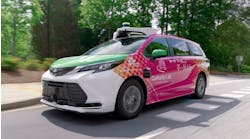HDOT deploys autonomous shuttle at Daniel K. Inouye International Airport
The Hawaiʻi Department of Transportation (HDOT) has launched a new autonomous electric passenger shuttle pilot that could eventually augment the existing Wiki Wiki shuttle bus service at the Daniel K. Inouye International Airport (HNL). The new fleet of shuttles, named Miki, the Hawaiian word for agile, will provide another option for airport users to travel between gates and terminals.
“We are proud to launch the Miki shuttle service, which will provide additional convenience for our airport users,” said HDOT Director Ed Sniffen. “The autonomous electric vehicles add to our ongoing progress to transition our vehicle fleet to electric vehicles and will help meet the state’s sustainability goals.”
During the 18-month pilot project, HDOT and its partners will evaluate ways to increase overall efficiency of the intra-airport transportation service. Departing and arriving passengers will have access to a pair of continuous autonomous shuttles out of a total of four, operating on a robust service schedule along the same route as the Wiki Wiki buses between the C and G gates and Terminals 1 and 2. Travelers can board the Miki shuttle with their carry-on baggage on the third level. The Miki shuttle began service to the general public on April 17 and follows the same schedule as the Wiki Wiki buses.
The electric shuttles, services and software are supplied by Beep, Inc., a leading provider of autonomous shared mobility solutions.
“We applaud our partners at Hawaiʻi DOT, Sustainability Partners and the Daniel K. Inouye International Airport (HNL) for their innovative integration of advanced autonomous mobility solutions in this pioneering project,” said Joe Moye, Beep CEO. “Through this collaboration, Beep will leverage its national experience in deploying and proving out these rapidly evolving technologies across multiple states and communities while emphasizing our unwavering approach to safety and sustainability. Together, we’re enhancing accessibility and ensuring mobility for all.”
Each Miki shuttle can hold 11 passengers, including the shuttle attendant. They are also ADA-accessible and can accommodate one wheelchair. The shuttles will operate at a maximum speed of 10 mph.
While the Miki shuttles will be driven autonomously, an attendant will be on board at all times to serve as ambassador for the new shuttle pilot project and to educate riders on how Miki operates and the service offered at HNL. Shuttle attendants are trained on the autonomous shuttle’s safety features and can take over manually at any time by utilizing a controller on board.
The introduction of the Miki autonomous electric passenger shuttle is another element of the continuing efforts to reduce Hawai‘i’s reliance on fossil fuels by transitioning the state’s fleet vehicles to electric vehicles. Last summer, HDOT, in collaboration with the University of Hawaiʻi at Mānoa, launched its first autonomous electric passenger shuttle as part of the University’s Rainbow Shuttle service to transport students and staff around campus.
This pilot project is made possible through the state’s infrastructure as a service contract with Sustainability Partners, which enables HDOT and other interested state and county agencies to procure electric vehicles and charging infrastructure on a per-mile cost basis.
“The Hawaiʻi Department of Transportation continues to be at the forefront of the transition to electrified and automated transportation and we could not be more thrilled to support its mission and vision,” said Thomas Cain, CEO of sustainability partners.

